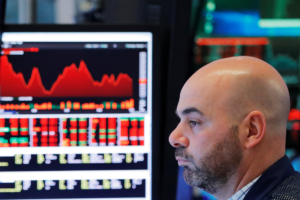The recent global stock market sell-off has left investors reeling after a weaker-than-expected jobs report sent shockwaves through the financial world. The question now looms large as to the strength of the U.S. economy and whether the Federal Reserve can navigate a smooth landing from the inflationary surge brought on by the pandemic.
The turmoil began in Japan, with the Nikkei index experiencing its worst one-day loss since Black Monday in 1987, plummeting by 12.4%. This set the stage for U.S. investors to follow suit, with the Dow Jones Industrial Average dropping over 1,000 points (2.6%), the S&P 500 falling 160 points (3.0%), and the Nasdaq taking a hit of 576 points (3.4%). Crypto assets were not spared either, as Bitcoin tumbled around 9%. Interest rates also saw a decline as investors sought safer assets, leading to the 10-year Treasury yield dropping to its lowest level in over a year.
Market analysts have pinpointed various reasons for the sell-off, including concerns over a weakening job market in the U.S., tepid corporate earnings, and a surge in tech stocks driven by possibly unfounded optimism in artificial intelligence. However, a major factor contributing to the turmoil appears to be the unwinding of the Japanese carry trade, where investors borrow at low rates in Japan and invest at higher rates elsewhere. Rising interest rates in Japan and a strengthening yen have disrupted this trade, causing ripple effects globally as investors adjust their positions.
While the market reaction has been significant, economists like Justin Wolfers caution against drawing dire conclusions about the economy based solely on short-term market movements. They emphasize that key indicators such as wages, employment, incomes, and spending paint a picture of an economy that is actually performing reasonably well. This discrepancy between market volatility and economic fundamentals raises questions about the true significance of the sell-off.
Despite the panic on Wall Street, experts like RSM Chief Economist Joseph Brusuelas view the event as a market correction rather than a recession signal. They attribute the sell-off more to the unwinding of leveraged positions associated with the Japanese carry trade and normalization policies by central banks like the Federal Reserve. As the dust settles, the Fed’s response will be closely watched, with expectations growing for a larger rate cut at the next meeting in mid-September.
In the midst of this financial turmoil, political figures have seized the opportunity to weigh in. Republican presidential candidate Donald Trump was quick to blame Vice President Kamala Harris for the market downturn, labeling it the “KAMALA CRASH” and warning of a potential “GREAT DEPRESSION OF 2024.” The intense rhetoric from political figures underscores the significance of market events in the eyes of voters as the election approaches.
Despite the drama and speculation surrounding the recent market sell-off, investors are advised to maintain a long-term perspective and not get swept away by short-term fluctuations. By staying informed and understanding the underlying factors at play, investors can navigate volatile market conditions with confidence and clarity. Remember, the key to successful investing is to focus on the fundamentals and avoid making impulsive decisions based on market noise. Stay tuned for more updates and insights from Extreme Investor Network to help you navigate the ever-changing landscape of finance and investing.

